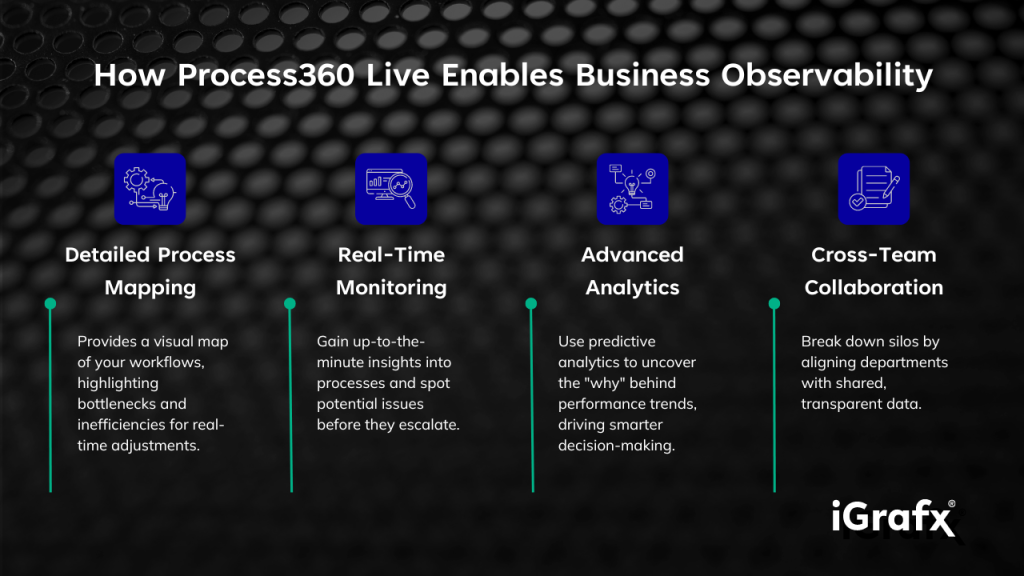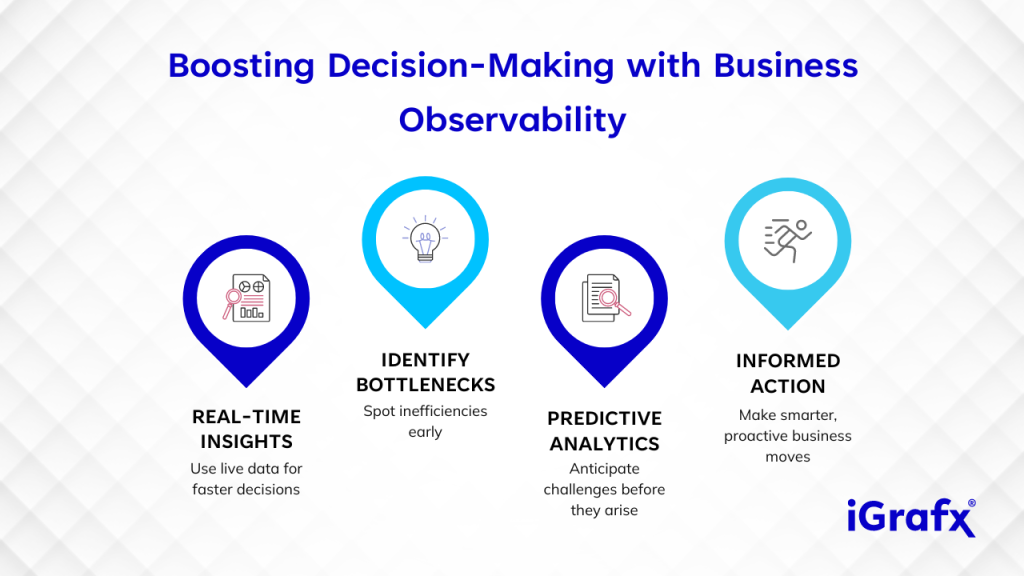In today’s fast-paced business environment, staying ahead requires more than just reacting to problems as they arise. The real winners are those who can anticipate and adapt, transforming challenges into opportunities before they even surface. But how can businesses achieve this kind of foresight? The answer lies in business observability—a term that’s gaining momentum across industries, and for good reason.
When was the last time your organization truly knew what was happening across every process, every system, in real time? Sure, we’ve all got dashboards and analytics reports, but observability takes things a step further. It’s about truly understanding the why behind your data, not just the what. And in the era of digital transformation, the why is what will set you apart from your competition.
What Exactly Is Business Observability?
At its core, business observability is about achieving visibility into every nook and cranny of your operations. It means pulling together data from various processes, systems, and customer touchpoints to create a single, comprehensive view of how your business is performing—and more importantly, why it’s performing that way.
Think of observability as the ultimate map for your business. Instead of simply knowing that you’ve arrived at point B from point A, you can track every twist, turn, and detour that got you there. This deep understanding allows leaders to make more informed decisions, preempt potential disruptions, and improve overall efficiency.
Key Components of Business Observability
- Data Integration: Businesses today operate in a complex ecosystem of applications, platforms, and systems. Observability depends on integrating data from all of these touchpoints, creating a holistic view that connects the dots between what’s happening across the organization.
- Real-Time Monitoring: Observability isn’t just about post-event analysis. It’s about having real-time insights into your operations, allowing you to respond as things are happening.
- Root Cause Analysis: Sure, you can see that something’s gone wrong—but observability helps you dig deeper and find out why it went wrong. It provides the ability to trace issues back to their root causes, so you can prevent them from happening again.
Why Does Business Observability Matter?
Let’s be honest—there’s no shortage of metrics in business today. You’re probably swimming in data. So, why should observability be at the top of your priority list? The truth is, it’s no longer enough to have siloed data points or periodic reports. In a world where markets shift overnight and customer expectations are constantly evolving, businesses need to be proactive rather than reactive.
Here are just a few reasons why business observability is crucial:
Enhanced Decision-Making
With observability, you’re not just collecting data—you’re collecting the right data and making sense of it in real time. Imagine the competitive advantage that comes with making a decision based on what’s happening right now instead of on last month’s trends. Observability turns data into action, empowering leaders to steer the ship with confidence, even in stormy seas.
Increased Operational Efficiency
We’ve all heard the old adage: “You can’t improve what you don’t measure.” Well, observability takes that one step further. It’s not just about measuring; it’s about truly understanding what’s going on within your operations and finding new ways to streamline processes. This goes beyond identifying bottlenecks—it’s about recognizing opportunities for optimization before inefficiencies arise.
Proactive Risk Management
In business, there’s always risk. But what if you could spot those risks before they became full-blown crises? Business observability enables you to identify anomalies and outliers, offering a heads-up on potential issues before they escalate. It’s about moving from firefighting to fire prevention.
Facilitating Continuous Improvement
What sets truly great businesses apart from the rest? The drive for continuous improvement. Business observability fosters a culture of iterative enhancements by providing teams with constant feedback on how processes are performing. This enables not only efficiency gains but also more meaningful innovation.
How Process360 Live Fuels Business Observability
To achieve this level of observability, organizations need more than just spreadsheets and ad hoc reports. Enter Process360 Live—a dynamic tool designed to enhance business observability by delivering robust process intelligence in real time.
So, how does Process360 Live fit into the grand scheme of things? It’s simple: you can’t achieve true observability without process intelligence, and that’s exactly where Process360 Live shines.
- Detailed Process Mapping for True Transparency
One of the biggest challenges businesses face is understanding how various processes fit together. With Process360 Live, you get a clear, detailed map of every workflow in your organization. It’s like going from navigating with a vague description to using GPS. Suddenly, the entire terrain is visible—and that’s where real insights are born.
Imagine having a bird’s-eye view of your organization’s processes, identifying inefficiencies or roadblocks instantly. That level of clarity isn’t just a nice-to-have; it’s a game-changer. With Process360 Live, this process intelligence doesn’t just sit in a silo—it’s integrated into your overall observability strategy, helping connect every piece of the puzzle.
- Real-Time Monitoring to Stay Ahead of the Curve
In today’s business environment, reacting to problems is no longer good enough. Process360 Live offers real-time performance monitoring, allowing businesses to not only spot issues as they arise but to anticipate potential challenges before they become major problems. With this capability, businesses are better equipped to pivot and adapt on the fly, ensuring they remain agile in a constantly evolving market.
Whether it’s process slowdowns, bottlenecks, or compliance hiccups, Process360 Live empowers you to address problems before they become full-blown crises. When observability and real-time monitoring combine, you’re not just gathering data—you’re gaining the foresight to act before it’s too late.
- Advanced Analytics for Deeper Insights
While surface-level metrics can tell you what’s happening, Process360 Live’s advanced analytics go deeper, uncovering the “why” behind performance trends. This is the kind of information that allows businesses to move from reactive problem-solving to proactive optimization.
With AI-driven insights and predictive modeling, businesses can anticipate challenges and opportunities alike. Think of it as being able to see not only the road ahead but also the detours, potholes, and shortcuts that can make your journey smoother.
- Collaboration and Process Alignment
Business observability is most powerful when the entire organization is aligned. Process360 Live fosters cross-departmental collaboration, ensuring that teams across your organization are looking at the same data, drawing the same conclusions, and working toward shared goals. It’s not just about visibility—it’s about ensuring everyone is on the same page.
With collaboration tools baked into Process360 Live, observability becomes an enterprise-wide effort, breaking down silos and ensuring that insights turn into action.
How to Boost Business Observability
So, how can you improve your organization’s observability? Here are five steps to get you started:
- Invest in Integrated Tools: Make sure you’re using tools that provide a unified view of your operations, like Process360 Live. By integrating data from multiple systems, you’ll gain a more complete picture of what’s happening across your business.
- Leverage Real-Time Data: Don’t wait for quarterly reports or monthly summaries. Implement real-time monitoring solutions to get a clear view of performance metrics as they happen, giving you the ability to act quickly.
- Focus on Root Causes: Use advanced analytics to drill down into the “why” behind performance issues. Identifying root causes helps prevent problems from recurring.
- Encourage Cross-Functional Collaboration: Observability isn’t just for IT or operations—every team in your organization should be involved. Foster a culture of collaboration and ensure that everyone has access to the same data.
- Embrace Continuous Improvement: Observability provides the feedback needed for continuous improvement. Regularly review your processes, and don’t be afraid to make changes based on what the data is telling you.
The Future of Business Observability
As we move further into the digital age, the need for business observability will only grow. Businesses that prioritize observability will be better equipped to navigate uncertainty, capitalize on opportunities, and drive long-term growth.
But here’s the catch: observability isn’t a one-time fix. It’s an ongoing commitment to understanding and improving your operations. It requires the right mindset, the right culture, and the right tools. Process360 Live provides the foundation for this ongoing journey, ensuring that businesses have the process intelligence they need to thrive.
Conclusion
So, where does your business stand in terms of observability? Are you confident in your ability to spot problems before they escalate, or are you stuck in a reactive cycle? The businesses that succeed in today’s environment are those that prioritize observability and make it an integral part of their strategy.
With Process360 Live, the power to transform your business is in your hands. From real-time monitoring to advanced analytics and process mapping, this platform provides everything you need to take your business observability to the next level.
Ready to unlock your organization’s potential? Book a Process360 Live demo and watch your operations transform.
Business Process Observability FAQ’s
What is business process observability, and why is it important?
Business process observability refers to the ability to monitor, analyze, and optimize business processes in real time. It provides transparency into how processes operate and helps businesses make data-driven decisions, identify bottlenecks, and improve efficiency, ultimately driving better performance and customer satisfaction.
How does business process observability differ from traditional monitoring?
While traditional monitoring focuses on system health and performance, business process observability offers a deeper view into the actual processes within the system. It tracks every step, from workflows to operations, providing a holistic view that enables optimization and proactive adjustments. This comprehensive insight helps improve both efficiency and customer outcomes.
How can business process observability tools help improve decision-making?
Business process observability tools provide real-time data and actionable insights into how processes are functioning. By visualizing workflows, identifying inefficiencies, and offering predictive analysis, these tools help businesses make more informed, agile decisions. Platforms like iGrafx’s Process360 Live allow companies to simulate different scenarios, ensuring that changes to processes are well-informed and impactful.



